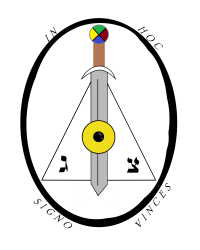Home / What is Thelemic Spiritism? / On Religion / Joy / Health & Safety / Methodology / Community / 'Spooky' Behaviours / Advancement / Book Recommendations
The main elements of the practice are Spirit Work and The Handbook, and extracts on them from the Newcomer infosheet are given below, alomg with further considerations:
"It seems odd to present a rudimentary version of a core spiritual practice, however this is in line with the personal nature of the system. The specifics are filled in by the practitioner, based on what works best; and over time, with exploration, it will evolve as they gain experience and experiment.
"The simple elements are:
"One could, of course, get far more elaborate; but this is the bare-bones version.
"How this might look in practice: Say you start with The Fool (Atu 0) on the mantle (or wherever else), and every morning light a candle and meditate. Throughout the week you might look into existing interpretations of the card to gain some depth. After a week, you move onto The Magus (Atu I), and so on. When ready, you would begin work on your Handbook. Depending on what format works best for you, the methodology could look very similar; with the obvious addendum that you would be writing down some representation of your interpretation."
"The Handbook is Sacred, but not secret; note that here and elsewhere ‘Sacred’ and ‘Holy’ denote a relation, not an inherent quality. Dinner time is ‘Sacred’ in this way (no uninvited guests between 1700-2000, please). It is a self-made reference, with the intention for it to be grounds for continued interpretation. The Christian Bible is sometimes referred to as a ‘living book’ in reference to the way in which a passage may be interpreted differently based on circumstance, or throughout one’s life; if we view the idea of a ‘Holy Book’ as akin to a genre, this would represent a high-water mark in terms of utility. As this is made solely for the practitioner’s use, the particulars around formatting pertain solely to what is most resonate for the person making it (although some groups pick a shared formatting to promote cohesion).
"This is not done with ‘completion’ in mind. A practitioner will hand-write and hand-bind their Handbook, then use it as a reference - particularly during the year prior to advancement, during the candidate is required to step away from the group, tend solely to mundane matters, and contemplate whether taking on more administrative responsibility (or any, at that!) would be right for them. Eventually, work commences on another Handbook, incorporating new understanding, as the most important aspect is the process of reflection, interpretation, and expression."
"These practices are well supported by the keeping of a journal. Regardless of practice, a journal is a useful tool for reflection. It allows us to keep track of what we’re thinking and feeling, externalise them to react while they are in a static form, and to record events for interpretation, reflection, and analysis. Further, it is helpful while in the process of constructing one’s handbook, and for keeping track of work with Tarot as detailed below."
"Tarot is derived from the game tarocchi, and has a long history of symbolic associations (although not as long as some might claim). We don’t utilise it based on some fantasy that such-and-such ancient initiates recorded their secrets in it, or whatever hooey people construct as an appeal to authority; simply, it suits our purposes. Regardless, it is a wonderfully developed symbol set and is used in concert with Qabalah in Thelemic Spiritism, along with many other traditions. Therefore, practical experience with it goes a long way. Two methods of use are Daily Draws and Spreads.
"A Daily Draw is the practice of shuffling and drawing a single card at the start of the day. That card is then used as a focal point for contemplation. For example, if you draw the Five of Wands, you might spend the day considering the role of strife in your life, and your relationship to it. Do you get angry too easily, or make mountains out of molehills? Are you a pushover, and avoid conflict even when it is called for? Thoughts are recorded in one’s journal, and events relating to the topic (eg, in the example above, if you get into an argument with a coworker) are given special attention.
"A Spread is more involved; one shuffles and ‘spreads’ the cards in a layout, in which each position represents something (the ‘Celtic Cross’ is a favourite). The cards are then considered, respective of its position, may be related to aspects of one’s life, and further how these aspects relate to each other. This occasions a novel perspective perspective and consideration of events outside the habitual. It can be considered in spiritual terms, but is far more useful in agreement with a practical/psychological viewpoint. Often, practitioners do this with an open-ended question in mind to seek clarity on a particular topic. It is worthwhile to revisit recorded spreads, as hindsight may provide additional room for consideration.
"Tarot is an excellent servant but a terrible master; just because it is ‘in the cards’ does not make it so, and it must be remembered all meaning is imposed. Anyone who claims to prognosticate, especially if they charge for it, should be viewed with suspicion. Likewise, they’re just cards - we only trad them as ‘Sacred’ to affirm the value we find in them. ‘The Devil’ won’t jump out of Atu XV, it is only a drawing."
Our documents have been collected here in print form.

Made With The Approval Of The I.O.